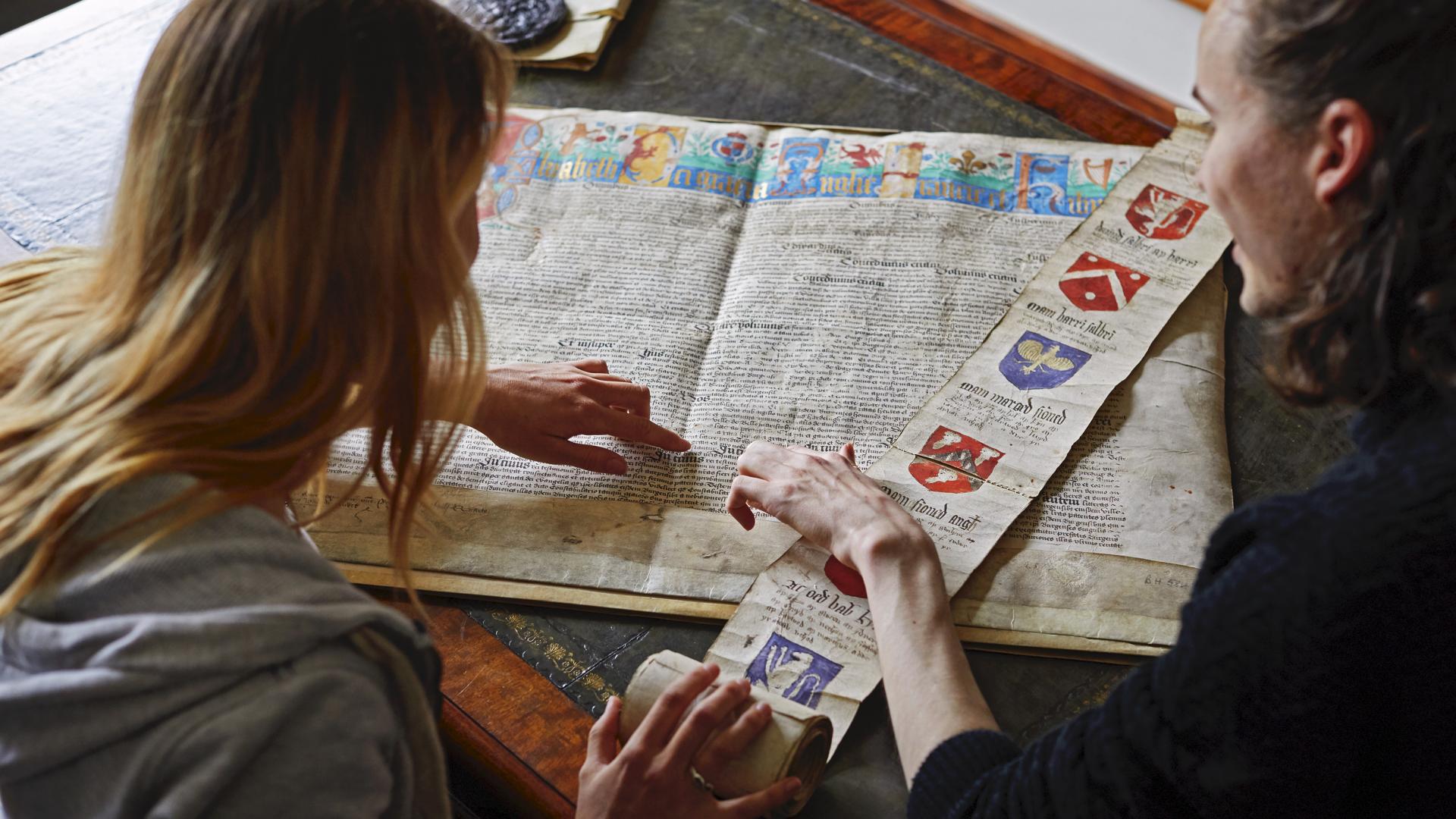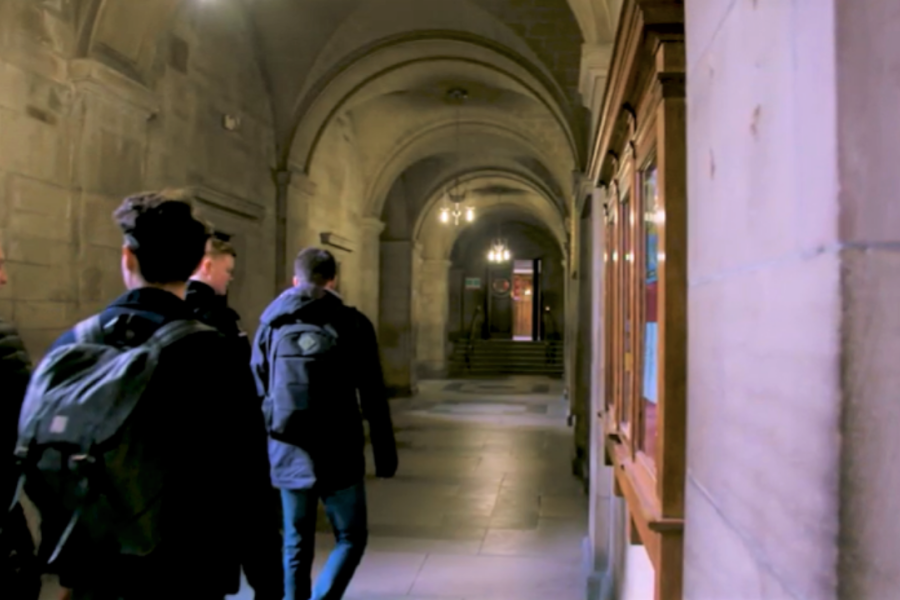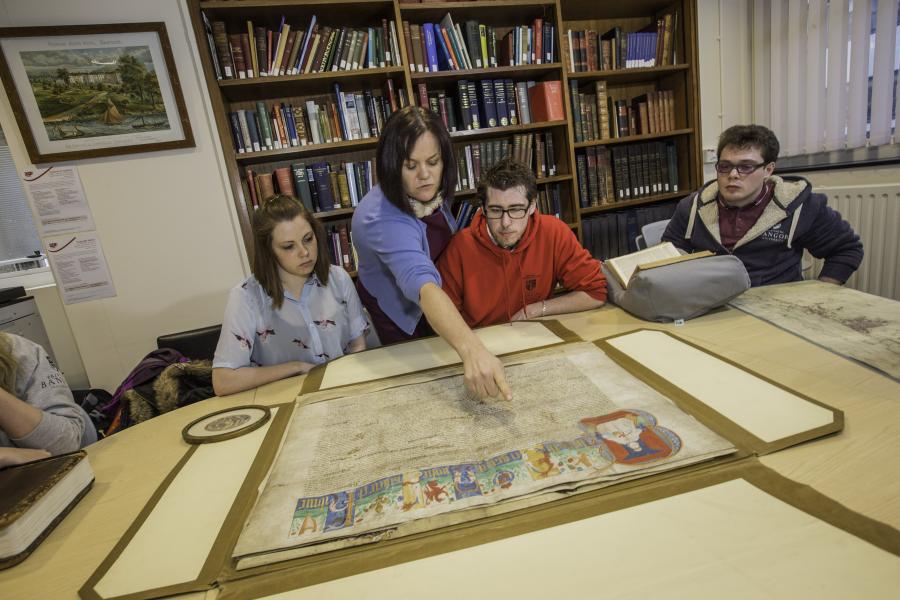About This Course
History is an inspirational, dynamic, relevant subject. The breadth of topics offered in our degree span the Neolithic period right up to the more recent past. Covering aspects of the history of Wales, Britain, Europe and the wider world, you will build knowledge in political, social and cultural themes. Valued by employers, the practical and transferable skills gained will prepare you for many possible careers, e.g. civil service, heritage sector, the media, or law.
This course aims to develop your knowledge and understanding of a wide range of human history. It encourages you to take an analytical approach to the past, so that you can understand and contribute to historical controversies, and can understand ways in which the past is at least partly constructed in the present. It therefore hopes to train you intellectually so you can explain the relevance of the past in the present, understand the problems of interpreting written and other evidence, and gain skills of research, analysis, problem-solving, construction of argument and communication.
History is one of the most inspiring, dynamic and relevant subjects that can be studied at degree level, and so it is no surprise that History remains one of the most popular degree subjects in the UK. It has an established range of concerns, but it is always expanding and changing as it responds to new themes or ideas raised by other disciplines. It is also a very practical subject, and during your degree you will develop various transferable skills that employers value highly. Surveys consistently indicate that History graduates obtain employment more rapidly than graduates in many apparently more 'vocational' subjects.
Why choose Bangor University for this course?
- A flexible degree structure that encourages you to explore and develop your interests.
- A local area steeped in history (including UNESCO World Heritage Sites) and provides a resource for fieldwork and a superb location for study.
- We have experts in all fields of history from the Middle Ages to the 20th century, working principally on Britain, Europe and the USA.
Additional Course Options
This course is available with a Placement Year option where you will study for 1 additional year. The Placement Year is undertaken at the end of the second year and students are away for the whole of the academic year.
The Placement Year provides you with a fantastic opportunity to broaden your horizons and develop valuable skills and contacts through working with a self-sourced organisation relevant to your degree subject. The minimum period in placement (at one or more locations) is seven calendar months; more usually you would spend 10-12 months with a placement provider. You would normally start sometime in the period June to September of your second year and finish between June and September the following year. Placements can be UK-based or overseas and you will work with staff to plan and finalise the placement arrangements.
You will be expected to find and arrange a suitable placement to complement your degree and will be fully supported throughout by a dedicated member of staff at your academic School and the University’s Careers and Employability Services.
You will have the opportunity to fully consider this option when you have started your course at Bangor and can make an application for a transfer onto this pathway at the appropriate time. Read more about the work experience opportunities that may be available to you or, if you have any questions, please get in touch.
This course is available with an International Experience Year option where you will study or work abroad for 1 additional year. You will have ‘with International Experience’ added to your degree title on graduating.
Studying abroad is a great opportunity to see a different way of life, learn about new cultures and broaden your horizons. With international experience of this kind, you’ll really improve your career prospects. There are a wide variety of destinations and partner universities to choose from. If you plan to study in a country where English is not spoken natively, there may be language courses available for you at Bangor and in your host university to improve your language skills.
You will have the opportunity to fully consider this option at any time during your degree at Bangor and make your application. If you have any questions in the meantime, please get in touch.
Read more about the International Experience Year programme and see the studying or working abroad options on the Student Exchanges section of our website.
Course Content
During your degree you will learn through a variety of small-group seminar classes, fieldtrips, practical workshops, one-to-one tuition, and lectures of between 10 and 50 students. With key historic and World heritage sites on the doorstep, our location gives access to a rich resource of local heritage sites, monuments, and museums. From prehistorical burial mounds to stately homes and castles, this tremendous resource is an integral part of the course and used in our teaching through field trips, practical workshops, and excavations.
In the first year of your History degree you will choose from a selection of modules that are intended to provide a flavour of the degree as a whole. In the second and third year you will have a wide choice of more specialist and thematic modules with close consideration of original sources. This allows you to tailor your degree to your own interests. You will also research and write a dissertation on a topic of your choice in Year 3.
Alongside classroom teaching and fieldtrips, you will also benefit from a range of other academic and social activities in the School. These include student conferences and School journal, quizzes and social occasions, student-led trips and talks. Our students are also able to benefit from University schemes such as ‘Languages for All’ and ‘Welsh for Adults’ (free languages classes in French, German, Italian, Mandarin Chinese, Spanish and Welsh) and the Study Skill Centre.
Outside this time, you will prepare for seminars, carry out research, and complete assignments. Assessment is a mixture of essays, projects, presentations, and examinations. The dissertation is an important part of the final assessment. Throughout the course you will be supported by our expert and enthusiastic teaching staff.
Modules for the current academic year
Module listings are for guide purposes only and are subject to change. Find out what our students are currently studying on the History BA (Hons) Modules page.
Course content is for guidance purposes only and may be subject to change.
Facilities
General University Facilities
Library and Archive Services
Our four libraries provide a range of attractive study environments including collaborative work areas, meeting rooms and silent study spaces.
We have an extensive collection of books and journals and many of the journals are available online in full-text format.
We house one of the largest university-based archives not only in Wales, but also the UK. Allied to the Archives is the Special Collections of rare printed books.
Learning Resources
There is a range of learning resources available, supported by experienced staff, to help you in your studies.
The University’s IT Services provides computing, media and reprographics facilities and services including:
- Over 1,150 computers for students, with some PC rooms open 24 hours a day
- Blackboard, a commercial Virtual Learning Environment, that makes learning materials available on-line.
Course Costs
General University Costs
Home (UK) students
- The cost of a full-time undergraduate course is £9,000 per year (2021/22 entry and 2022/23 entry).
- The fee for all placement, international, and sandwich years is £1,350 (2021/22 and 2022/23).
- More information on fees and finance for Home (UK) students.
International (including EU) students
Additional Costs
There are also some common additional costs that are likely to arise for students on all courses, for example:
- If you choose to study abroad or take the International Experience Year as part of your course.
- If you attend your Graduation Ceremony, there will be a cost for gown hire (£25-£75) and cost for additional guest tickets (c.£12 each).
Course-specific additional costs
Depending on the course you are studying, there may be additional course-specific costs that you will be required to meet. These fall into three categories:
- Mandatory Costs: these are related to a particular core or compulsory module that you’ll be required to complete to achieve your qualification e.g. compulsory field trips, uniforms for students on placement, DBS Check.
- Necessarily Incurred Costs: these may not be experienced by all students, and will vary depending on the course e.g. professional body membership, travel to placements, specialist software, personal safety equipment.
- Optional Costs: these depend on your choice of modules or activity and they are shown to give you an indication of the optional costs that may arise to make sure your choice is as informed as possible. These can include graduation events for your course, optional field trips, Welcome Week trips.
Entry Requirements
Offers are tariff based, 104 - 128 tariff points from a Level 3 qualification* e.g.:
- A Levels: History or Archaeology preferred but not required. General Studies and Key Skills not normally accepted.
- BTEC National Extended Diploma: DMM - DDM
- Cambridge Technical Extended Diploma: DMM- DDM
- City & Guilds Advanced Technical Extended Diploma (1080): considered on a case-by-case basis
- International Baccalaureate Diploma: accepted
- Access: pass required
- Welsh Baccalaureate: We will accept this qualification in conjunction with other level 3 qualifications
- T Levels: T Levels in a relevant subject considered on a case-by-case basis
- Extended Project Qualification: Points can include a relevant Extended Project (EPQ) but must include a minimum 2 full A-levels, or equivalent.
We are happy to accept combinations of the qualifications listed above, as well as alternative Level 3 qualifications such as City & Guilds, Access and Cambridge Technical Diplomas.
We also welcome applications from mature learners.
International Candidates: International Candidates: school leaving qualifications that are equivalent to A levels/Level 3 and/or college diplomas are accepted from countries worldwide (subject to minimum English Language requirements). More information can be found on our International pages.
*For a full list of accepted Level 3 qualifications, go to www.ucas.com.
General University Requirements
To study for a degree, you’ll be asked for a minimum of UCAS Tariff points. For a fuller explanation of the UCAS Tariff Points, please see www.ucas.com.
We accept students with a wide range of qualifications and backgrounds and consider each application individually.
All students need to have good basic skills and the University also values IT and communication skills.
As part of the University’s policy, we consider applications from prospective disabled students on the same grounds as all other students.
We also consider applications from mature students who can demonstrate the motivation and commitment to study a university programme. Each year we enrol a significant number of mature students. For more information about studying as a mature student, see our Studying at Bangor section of the website.
EU and International Students' Entry Requirements
For detailed guidance on the entry requirements for EU and International Students, including the minimum English Language entry requirement, please visit the Entry Requirements by Country pages. International applicants can also visit the International Education Centre section of our website for further details.
Bangor University offers International Incorporated Bachelor Degrees for International students whose High School qualification is not equivalent to the UK school leaving qualification. The first year (or Year 0) is studied at Bangor University International College, an embedded College on our University campus and delivered by Oxford International Education Group.
Careers
History is a very versatile degree. This course provides specialist knowledge and a range of analytical and presentational skills which will enable you to tackle a variety of career options centring on administrative and leadership needs, for example, in company personnel departments, the civil service and local government as well as in a range of directly transferable vocations. Our History graduates enter a wide range of employment: especially fields which require skills of communication, analysing large quantities of information, and understanding human nature. Graduates have in recent years gained careers in museum work, law, teaching and the cultural industries. Many graduates also progress to higher education postgraduate schemes.
History graduates are desirable employees due to the variety of skills they develop during their degree. These transferable skills include:
- An ability to review critically the literature and formulate logical and structured arguments
- An ability to make effective oral presentations
- The development of writing and editorial skills
- An appreciation of the complexity and diversity of situations, events and past mentalities
- Experience gained from carrying out and completing a major research project in the third year – the dissertation
- Good IT skills
- Time management skills
These transferable skills are fundamental to other employment sectors, such as the public sector, teaching, journalism, law, accountancy and management.
Year 2 and 3 students are provided with the opportunity to complete work-placement modules, which can be carried out in the university or through external organizations. These are assessed as part of the final degree. The programme enhances employability prospects and offers an insight into the type of employment opportunities a degree in history offers. Students have undertaken placements in a wide range of workplaces, including archives and heritage agencies.
Opportunities at Bangor
The University’s Careers and Employability Service provides a wide range of resources to help you achieve your graduate ambitions.
The Bangor Employability Award (BEA)
The BEA is a comprehensive online course that you can work through at your own pace, taking you through all the steps you need to take to explore, prepare and apply for your dream career.
Internships
Bangor University runs a paid internship scheme within the university’s academic and service departments.
Student Volunteering
Volunteering widens your experience and improves your employability. Find out more about volunteering on the Students’ Union’s website.
Foundation Year
A ‘with Foundation Year’ option is available for this course. Apply for History (with Foundation Year).
What is a Foundation Year course?
If you don’t have the required qualifications for the degree-level course or are looking to re-enter education after time away from study, then a Foundation Year Programme might be the right choice for you.
The Foundation Year is an excellent introduction to studying this subject at university and will provide you with the knowledge, skills and confidence required to go on to study this course at degree-level.
When you have successfully completed the Foundation Year, you can progress on to the first year of this degree-level course.





